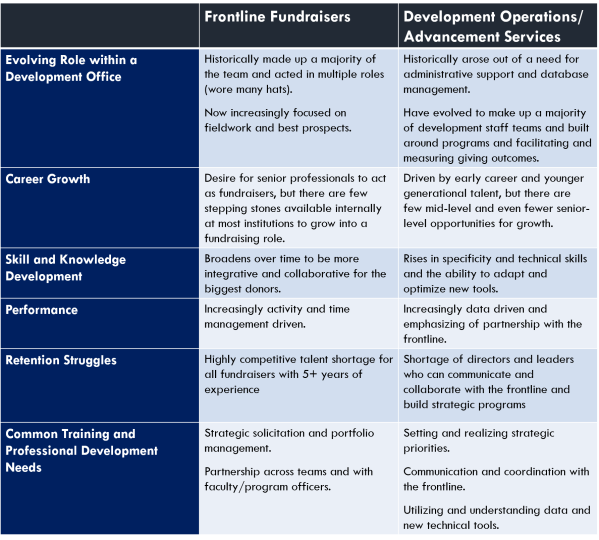
We’ve spent a lot of time so far talking about frontline fundraisers (what makes some stronger, how to recruit them, how to support them, and how to think about their time), and it’s easy to forget about those who make the wheels turn in a development office: the operation/advancement team.
You can have a stellar fundraising front line, but without equally strong back up and structure your results can fall flat. Here are five reasons why development operations deserve more applause and attention.
(1) A well-managed database keeps donors happy
Database accuracy is a constant challenge for development shops. Those that struggle with maintaining strong records and contact information are more inclined to make mistakes. Sometimes these errors can be as basic as sending direct marketing solicitations to someone who has requested no contact. Other times a weak database tracking can result in fundraisers dueling and competing for the same prospects. The most damaging effects of a weak database can be in the area of donor stewardship and relationships. I’ve seen an organization invite donors to a recognition event only to have nearly half of the donors at incorrect or out of date recognition levels, and I’ve worked with another institution that sent a solicitation addressed to a married couple of longtime major donors when the recipient was recently widowed. Data errors like this happen, but a strong database management team can prevent a majority of them and put safeguards in place to catch and respond to those errors that do make it through.
(2) Well-crafted reporting, research, analytics, and prospect management can elevate fundraising results
You can have your fundraisers make 100 calls a month, but if they are not meeting with the right people their results are likely to remain lackluster. Development operations/advancement services is not an area that merely tracks and records fundraising activity; it directs and facilitates a more strategic and success-oriented fundraising team. Investing in talent in development operations means that your office is more likely to have a team capable of identifying, targeting, and understanding your institution’s strongest prospects and leveraging your organization’s most compelling elements. This results in better protected and targeted frontline fundraising, leading to better results and long-term sustainability.
(3) Strong leadership in development operations balances out the overall office’s perspective and management
We’ve talked about the difficulty of finding one individual with the ability and inclination to manage an entire development office. There’s a certain degree of politics to be played with leadership, fundraisers, and donors alike. On the other hand you need a strong data-driven and analytical mind in leadership to direct the technical aspects of your development shop as well as apply their understanding of operations to overall mission and goal setting. If all staffing in development operations/advancement services is at the junior level you lose this valuable perspective. You also communicate to your infrastructure team that their role is less visible and valuable within the office because they do not have an ally at the leadership level.
(4) Turnover in development operations staffing can be incredibly disruptive
Most people who have worked in the fundraising field for more than 5 years have lived through (survived?) a database or system conversion. They’re messy, and things get lost, and sometimes you feel like the supposed new efficiency isn’t worth the frustration. A turnover in staff can have a less public but similar disruptive effect. If an office doesn’t seek to retain and reward talent in operations then it will quickly lose to competition those individuals who not only have great technical skills but have an understanding of your organization, donor base, and processes that cannot be easily picked up by a new hire.
(5) Development operations/Advancement Services is a great place to build home-grown talent in all areas
Development operations teams tend have younger, more technologically savvy, and early career professionals. It is a great recruiting ground then for both operations leadership and fundraising talent alike. Fundraising programs that do not pay attention to this great resource therefore miss the great opportunity and potential organizational sustainability to build their own talent pools, having to rely more on the difficult world of poaching and recruiting talent to fill staffing and fundraising openings. Those who translate broader staff retention and talent management strategies to their operations team have a greater chance to keep and capitalize on their younger, high potential staff members.



